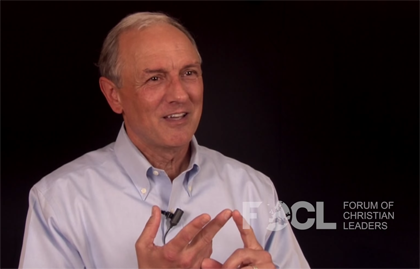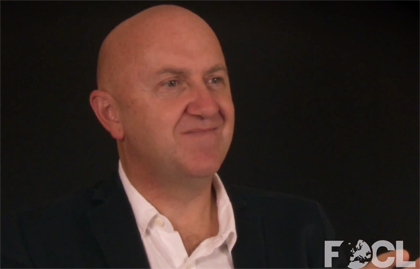If you want to build a house where another house already stands, what do you do? You need to deconstruct the current house to make room for the new one. The same thing is true with the Gospel.
 Photo: Thomas Kohler (Flickr, CC)
Photo: Thomas Kohler (Flickr, CC)
If you want to build a house where another house already stands, what do you do? You need to deconstruct the current house to make room for the new one. The same thing is true with the Gospel.
Paul wrote of this when he explained, “We demolish arguments and every pretension that sets itself up against the knowledge of God” (II Cor. 10:5). Paul was in the business of demolishing arguments and false ideas that were in competition with the Gospel. This is our job as well.
Imagine a farmer who thinks that all he has to do is dump seed on the field and expect a full crop to appear without any additional work. No, a farmer must plow and prepare the field; seed, fertilize, and water it; and protect it from weeds to eventually reap the crop. These are the very images Paul uses to describe his and other Christian leaders’ work in spreading the Gospel (I Cor. 3:6-9).
Think about how Jesus communicated. He was constantly confronting the beliefs of the religious leaders of his day and saying they were wrong. Jesus regularly said, “You have heard it was said” and then overturned it, “But I say to you.” Some of the most common phrases of the Gospels, like “Woe to you scribes and Pharisees,” underline this identifying and rejecting of popular beliefs. Jesus was regularly confronting and overturning false beliefs of his listeners. And those listening realized this: “They knew he had spoken this parable against them” (Luke 20:19).
Yet Christians today often say something like, “It is our job to present the Gospel, and it is God’s job to convert people.” There is both some truth and falsehood embedded in this approach to evangelism. Yes, God needs to open nonbelievers’ eyes to the truth of the Gospel (“The Lord opened her heart to respond to Paul’s message.” Acts 16:14); and yes, there is certain content to the Gospel that must be communicated in order for people to trust in Jesus.
But this approach to evangelism ignores how Paul or Jesus actually communicated. Jesus told parables, asked questions and sometimes spoke in a way that was not easy to understand. Paul adjusted his arguments of why the Gospel is true based on his audience. Paul used Old Testament prophecies with the Jews, and with the Greeks, he used their cultural symbols and literature. Both Jesus and Paul communicated creatively in response to the situations they faced. They both confronted and deconstructed false beliefs.
 Switzerland. / Brad Thames (Flickr)
Switzerland. / Brad Thames (Flickr)I had the opportunity to enjoy a leisurely Sunday lunch at Francis and Edith Schaeffer’s home in Switzerland with nine others who were studying at L’Abri Fellowship. The scene was lovely: there were flowers on the table, and the open windows let in the bright sunlight and fresh mountain air. The lunch was delicious hot soup, crunchy french bread and salad. The table didn’t break up into smaller hubs of conversation; instead we talked as a whole group from the beginning. After perhaps 15 minutes, Francis began asking questions of a forty-year-old woman sitting right next to him whose eight-year-old daughter was seated on her other side.
The conversation moved naturally from a general discussion to the two of them chatting. Francis asked one gentle question after another, and she explained over the course of lunch that her most passionate commitment was to her lovely and precious daughter sitting beside her. Francis asked questions about why she came to L’Abri and about her most basic convictions about life. It emerged in the conversation that she was a convinced atheist as a result of much study and deliberation. When Francis asked a series of probing questions, she acknowledged that as a materialist atheist, she did not believe in the concept of good and evil. She recognized that human beings did not have any unique value in her materialist worldview (because we were only animals driven by instincts) and that relationships were only a social mechanism of Darwinism without any real value.
But Francis kindly brought together the two parts of their discussion and asked the woman how she could explain or justify why she loved and cherished her daughter so much from her materialistic worldview. She said she knew her daughter was valuable and that loving her was the right thing to do, but she had no way to justify her deepest conviction and commitment from her atheism. It was gently revealed to her that her atheism was an inadequate foundation for such relational commitments, and thus her life was inconsistent with her worldview.
What do we see here? We see a Christian loving someone enough to help them see that their worldview does not provide support for their most profound convictions about life. He gently deconstructed her worldview, but never presented the Gospel. It was all loving pre-evangelism. Schaeffer describes this as “taking the roof off” to help people see that their current house (worldview) is inadequate.
“Every man has built a roof over his head to shield himself at the point of tension… At the point of tension the person is not in a place of consistency in his system, and the roof is built as a protection against the blows of the real world, both internal and external. … The Christian, lovingly, must remove the shelter and allow the truth of the external world and of what man is, to beat upon him. When the roof is off, each man must stand naked and wounded before the truth of what is.”2
Often before a nonbeliever is willing to seriously consider the truth claims of Christianity, he must be willing to question his current worldview or explanation of the world. A nonbeliever becomes increasingly open to an alternative when shown that his worldview does not adequately explain the world.
---------------------------------------------------------------------------------------
A Present-Day Example
Greg Koukl is the founder and President of Stand to Reason, an organization that trains Christians to think more clearly about their faith and to make an even-handed, incisive, yet gracious defense for classical Christianity and classical Christian values in the public square. Listen to Greg point out weaknesses of naturalism in “What problems does naturalism have in explaining life?”3
 Greg Koukl.
Greg Koukl.---------------------------------------------------------------------------------------
How do we help our unbelieving friends and family? We need to love and understand them and identify the particular roadblocks that are preventing them from responding to the Gospel. To clarify this process, we will examine the life and conversion of the great Christian writer Augustine of Hippo. By means of Augustine’s story, we can understand how someone goes through a biblical process of persuasion to make a commitment to Christ.
Loving People
The first principle of a biblical model of persuasion is loving people. The Gospel of Mark 6:34-36 relates how Jesus was confronted by the needs of the non-believing masses in the feeding of the five thousand:
“So they went away by themselves on a boat to a solitary place. But many who saw them leaving recognized them and ran on foot from all the towns and got there ahead of them. When Jesus landed and saw a large crowd, he had compassion on them, because they were like sheep without a shepherd. So he began teaching them many things.”
The Lord sees the crowds and he feels deep compassion for them because they were “like sheep without a shepherd.”
The Lord feels empathy and compassion in seeing people like this. What is fascinating about this passage is that the individuals that Jesus saw were not yet his disciples. These were masses of individuals who had not yet come to faith – they needed to hear and believe the life-changing message of the Gospel. Jesus teaches that these needy individuals need spiritual shepherds who will love them and lead them. With apologetics, we are not to merely protect our flock, but we are to seek to win the sheep without a Shepherd.
We see the reality of this love in how Augustine of Hippo came to faith in the 4th century. Augustine was attracted to the Gospel by the genuine love of the Christians he knew. Augustine described his mother’s love for him as drawing him to the Lord. He was also deeply impacted by Ambrose’s kindness and generosity. Ambrose’s love softened Augustine’s hard heart and helped him to be able to hear the Gospel with new ears. Lastly, we see Augustine was profoundly impacted at the very precipice of his conversion by the example of Anthony whose way of life, he writes, “was full of the sweet fragrance of you.” The reality of God’s love shown through Jesus’ loving disciples has rightly been called the ultimate apologetic. As Jesus taught, “by your love shall all men know you are my disciples” (John 13:35).4
Understanding
Because we love a nonbeliever, we seek to understand him or her. There is a very good reason why a careful missionary seeks to learn the language, history and culture of those individuals he is seeking to reach. To communicate effectively with anyone, we need to first understand them.
We see this contextual element in Jesus’ ministry. Jesus was communicating primarily to rural audiences. His parables reflect this agricultural background: Jesus taught about trees with good fruit or bad fruit, seeds that are fruitful or unfruitful, and trees that need to be pruned. Jesus understood his audience and employed images relevant to their life experiences. We also see Jesus tailor his messages to address specific individuals. He could not do this if he did not first understand his listeners.
Likewise, the Apostle Paul did not merely hike to each new city, repeat the same rote message and walk on. The New Testament chronicles an evangelist who sought to proclaim, explain and defend the gospel (persuade) in a way that made sense in each separate context. At the Athens Areopagus, Paul affirmed his pagan audience’s belief in an “unknown God,” quoted a pagan poet, and then explained the Gospel (Acts 17:16-34). In contrast, when Paul entered the synagogue in Thessalonica, “on three days he reasoned with them from the Scripture, explaining and proving that the Christ had to suffer and rise from the dead” (Acts 17:13). In other words, Paul sought to understand each audience he addressed and creatively sought to persuade them using references and language that they could understand.
---------------------------------------------------------------------------------------
An Example of Modern Objections
Grenville Kent, a filmmaker and lecturer in Old Testament and Arts at Wesley Institute in Sydney, Australia, speaks particularly to young adults on university campuses. He also creates apologetics films to address the most common objections that nonbelievers have in response to the Gospel. Grenville seeks to understand the common roadblocks for urban, educated nonbelievers to the Gospel and to dismantle them. Listen to Grenville answer the questions, “What are the common objections of urban, educated people to Christianity?” and “What factors incline educated, urban people towards belief in God?”5
 Grenville Kent.
Grenville Kent.---------------------------------------------------------------------------------------
A person’s path to faith is often obstructed by various roadblocks. An apologist who is seeking to help someone come to faith must first identify the particular obstacles between that person and a commitment to the Lord. Only after understanding an individual or group can an apologist help remove such difficulties. Let’s look at four examples of roadblocks in Augustine’s life.
 Cairo. / Eleanor McDowall (Flickr)
Cairo. / Eleanor McDowall (Flickr)Roadblock of Pride
The doorway to the truth is humility. If someone wants to enter, they must humbly lower their neck. When Augustine first examined Christianity, he rejected it, for it didn’t appeal to his inflated pride. He wrote:
“I therefore decided to give my attention to the study of the Holy Scriptures and to see what they were like… They seemed to me unworthy of comparison with the grand style of Cicero. For my pride shrank from their modesty, and my sharp eye was not penetrating enough to see into their depths.”7
At one point, Augustine’s mother, as a Christian, asked a bishop to speak to Augustine about the faith:
“My mother asked this bishop to be so kind as to discuss things with me, to expose my mistakes, to unteach me what was bad, and to teach me what was good; for he used to do this, if he found suitable people for his instruction. However, he refused to do so in my case, and very sensibly too, as I realized later. He told my mother that I was not yet fit to be taught, because I was full of self-conceit.”8
This bishop was an apologist. He discussed with enquirers, exposed their mistakes and false beliefs and taught them the truth. Yet the bishop wouldn’t even begin this process with Augustine because he realized that Augustine in his pride and self-conceit wasn’t humble and truly willing to learn. He wasn’t teachable. Haven’t we met skeptics like this? Individuals who ask questions not to gain answers but in their pride seeking to avoid answers. This is part of the apologist’s task – challenging prideful nonbelievers to sincerely search for the truth or perhaps not even being willing to talk to them at all.
Roadblock of Sin and Lust
In a curious incident in his youth, Augustine recalled stealing a few pears from a neighbor. Looking back on this event, he was puzzled why he and his friends had stolen when he had other and better pears freely available to him. Augustine acknowledged that he was persistently selfish and explained, “our real pleasure was simply in doing something that was not allowed.” 9
Augustine’s selfish desire flowered in his young manhood into a full-blown lust. He explained, “I lived a life in which I was seduced and seducing, deceived and deceiving, the prey of various desires.”10 Augustine had a mistress for fourteen years and was deeply attached to his sexual lifestyle. His sensual way of life continued to be an anchor that held him back even at the very brink of his conversion. Augustine recalled what he was thinking immediately before his conversion: “But wait. These worldly things too are sweet; the pleasure they give is not inconsiderable; we must not be too hasty about rejecting them.”11 Augustine later described his sexual desires as a chain which had kept him from the Lord. Only when his desire for the truth cut this anchor of sensuality away was he able to accept and receive the truth.
Roadblock of False Beliefs
The Christianity Augustine initially rejected was a warped and distorted Christianity of his own making. Writing to God later, Augustine explained, “When I thought of you, I was not thinking of something firm and solid. For it was not you yourself who were my God; my God was an empty fantasy, a creation of my own error.”12 Augustine had created a straw man of Christianity and had arrogantly knocked it aside.
Augustine’s problem, and that of many other nonbelievers today, was that he dismissed as false that which is false. Perhaps the most important apologetic question we can ask a nonbeliever today is “what kind of God is it - that you don’t believe in?” Often after they explain some distortion or false idea, we can respond, “I’m glad you don’t believe in that kind of God, because neither do I.” These false beliefs, these roadblocks, need to be identified and dismantled.
When Augustine did question Christians he encountered, they responded that such questions were necessarily sinful. These believers were fideistic -- they didn’t believe that there was a place for answering honest questions. These Christians taught that an inquiring individual must assume a posture of faith. Without forthcoming answers from Christianity, Augustine looked elsewhere.
Roadblock of False Paths to Truth
Curiously at one point, the very search for truth led Augustine away from the truth. 13 As a young man, Augustine began a search for the truth and was exposed to the teaching of the Manicheans, a philosophical sect. This group targeted individuals like Augustine who had a desire to learn. The Manicheans, Augustine explained, “were forcing no one to believe without first hunting for and disentangling the truth. Who would not be enticed by these promises? And could there not be special enticement for a youthful mind desirous of the truth.”14 The Manicheans provided an explanation for the world that was stripped of the “belief” that was required by the Catholics Augustine had encountered. As an added benefit, Manichean moral teaching enabled him to rationalize away his immoral life. Simultaneously, the Manicheans’ criticisms of the Bible were, in Augustine’s opinion at this point, “unanswerable.”15
Each nonbeliever has his own roadblocks to the gospel. Few individuals can approach Christianity without some emotional and intellectual baggage. These misconceptions, false beliefs, ideologies, addictions and desires are roadblocks that stop someone from considering the Gospel’s truth claims. The Lord has given us the task of being deconstructive apologists – understanding the obstacles and removing them one by one.
Deconstructive Apologetics
A deconstructive argument seeks to eliminate roadblocks like the ones that I described above. Sociological theory describes this process of deconstruction or destabilizing someone’s worldview as “nihilation.” The word nihilation comes from “nihilism,” the philosophical belief that rejects the existence of meaning in the world. In essence, this process of destabilizing someone’s worldview seeks to push them toward nihilism.
We see an example of nihilation when Augustine observed one Christian apologist publically confronting the Manicheans in open debate. Augustine recalled,
“I had begun to be disturbed by listening to a man called Elpidius who spoke and argued openly against the Manichees and produced evidence from the Scripture which was not easy to resist. And the answer which they [the Manichees] did give seemed to me a very feeble one.” 16
One of the goals of an apologist is to disturb nonbelievers, or to destabilize their worldview. Again this is what Schaeffer calls “taking the roof off.” It is exposing nonbelievers to the tension between their worldview and reality.
“This is what we mean by taking of the roof. But we cannot ever think this to be easy. The hardest thing of all is that when we have exposed modern man to his tension, he may still not be willing for the true solution. Consequently, we may seem to leave him in a worse state than he was in before.”17
We need to be willing, like the Old Testament prophets, to demolish the idols of our age. For example, the dominant goal (idol) of many people in the world is personal fulfillment. What are the elements of this alternative to Christianity? Does a pursuit of happiness actually bring personal fulfillment? Does this view explain the world in which we live? Each culture and context has different roadblocks and objections which need to be understood and dismantled to gain a hearing for the Gospel.
So far in this Apologetics series, we have shown the impact of apologetics in the life of William Wilberforce and explained how Apologetics is the Art and Science of Christian Persuasion. Today we’ve unpacked how a central element of apologetics is deconstructing and removing roadblocks to faith. Next week, we will discuss apologetics as positive persuasive argument for the truthfulness of the Gospel.
-----------
1Brad Thames. “Chalet and Flag.” (October 20, 2007). www.flickr.com
2 Francis Schaeffer, The God Who Is There (1968) in The Complete Works of Francis A. Schaeffer: A Christian Worldview, Volume One, A Christian View of Philosophy and Culture (Westchester: Crossway Books, 1982), 140.
3 For more resources from Greg Koukl, please visit http://www.foclonline.org/users/greg-koukl-0.
4 Augustine, The Confessions of St. Augustine, Trans. by Rex Warner. (New York: New American Library of World Literature, 1963), 110-112, 171. Some of the following portions echo or repeat word for word portions from my book Willow Creek Seeker Services (Grand Rapids: Baker Books, 1996), 187-205.
5 For more resources from Grenville Kent, please visit http://www.foclonline.org/users/grenville-kent#profile-main.
6 Eleanor McDowall. “Roadblock, Cairo.” (December 18, 2012).
7 Augustine, Confessions, 57.
8 Augustine, Confessions, 67-68.
9 Augustine, Confessions, 45.
10 Augustine, Confessions, 69.
11 Augustine, Confessions, 129.
12 Augustine, Confessions, 69.
13 Augustine, Confessions, 77. As Augustine writes, “as I went farther from the truth, I had the impression that I was drawing nearer to it.”
14 Augustine, Confessions, 8.
15 Augustine, Confessions, 106.
16 Augustine, Confessions, 106.
17 Schaeffer, The God Who Is There, 142.
Greg Pritchard earned his MA from Trinity School of Divinity before continuing on to finish his PhD at Northwestern University. The intersection of theology, history, philosophy and sociology is Greg’s primary focus both in teaching and writing. He has taught graduate-level courses on apologetics, theology, history, leadership, the New Testament, ethics, and Christian Thought at American, European, and Asian institutions of higher learning. His book, Willow Creek Seeker Services, has been published in four languages. In addition, Greg has worked as the COO at a Chicago investment firm. Currently, he serves as the President of the Forum of Christian Leaders and as the Director of the European Leadership Forum.
The Forum of Christian Leaders (FOCL) is the sponsor of the European Leadership Forum (ELF), which seeks to unite, mentor, and resource European evangelical leaders to renew the biblical church and re-evangelise Europe. This happens first at the ELF's annual meeting that occurs each May in Poland. In addition to the ELF, FOCL is host to an online media library and learning community for evangelical Christians. Learn more at foclonline.org and euroleadership.org; or join us on Twitter @FOCLonline and Facebook Forum of Christian Leaders.

Las opiniones vertidas por nuestros colaboradores se realizan a nivel personal, pudiendo coincidir o no con la postura de la dirección de Protestante Digital.
Si quieres comentar o